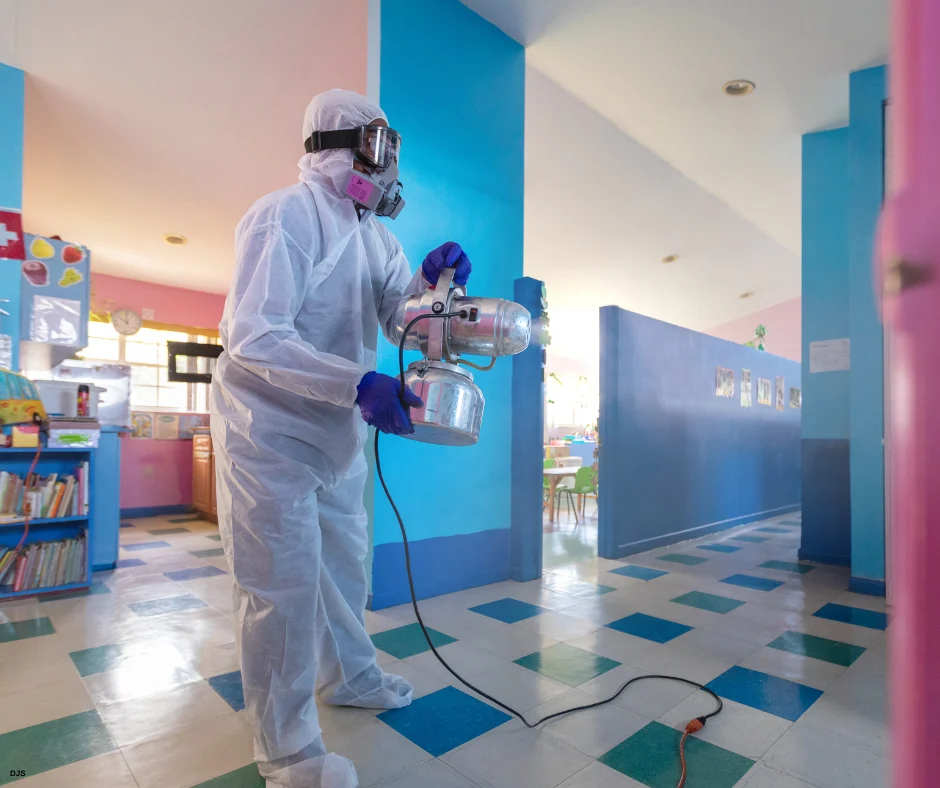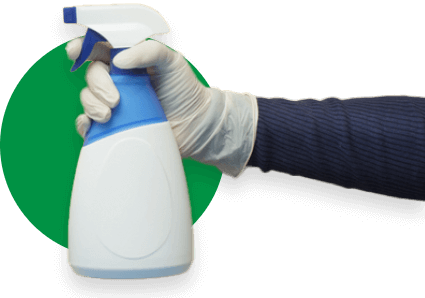What is disinfection, and how does it protect health? Disinfection eliminates harmful bacteria and viruses from surfaces using chemical agents, heat, or ultraviolet light. Unlike cleaning or sanitizing, disinfection kills pathogenic microorganisms, preventing disease transmission. Professional disinfecting services implement proper protocols, ensuring safe environments.
What is Disinfection?
What is disinfection in technical terms? Disinfection represents antimicrobial treatment, eliminating disease-causing microorganisms, including bacteria, viruses, and fungi. This process differs fundamentally from cleaning and sanitizing. Cleaning removes visible dirt and debris. Sanitizing reduces bacterial counts. Disinfection destroys pathogenic microorganisms completely.
Disinfection effectiveness varies by pathogen type and method used. Proper surface cleaning before disinfection increases pathogen elimination rates. Multiple disinfection methods exist, including heat treatment, ultraviolet germicidal irradiation, and EPA-registered chemical disinfectants. Understanding cleaning vs disinfecting clarifies the appropriate application for various situations.
Why Disinfection Matters
Understanding what disinfection is prevents disease transmission in critical environments. Viruses spread rapidly through contaminated high-touch surfaces. Doorknobs, light switches, tables, smartphones, and faucets harbor dangerous pathogens.
Healthcare facilities face strict disinfection requirements that meet public health standards. Medical devices and equipment require thorough disinfection, eliminating all pathogenic microorganisms. Contact time directly impacts disinfection effectiveness. Longer exposure periods achieve superior pathogen elimination rates.
Commercial spaces benefit significantly from routine disinfection protocols. Banks, restaurants, transportation hubs, and office buildings represent high-traffic environments. These locations facilitate rapid germ transmission. Regular disinfection protects occupants while maintaining operational capacity. Learning how to disinfect commercial surfaces properly ensures maximum protection.
Key Differences Between Disinfection Methods
What is disinfection across different methods, and how do they compare? Understanding distinctions helps select appropriate approaches:
| Method | Pathogen Kill Rate | Application Areas | Contact Time Required | Safety Considerations |
| Chemical disinfectants | 99.9% bacteria/viruses | Environmental surfaces, equipment | 30 seconds to 10 minutes | Requires protective equipment |
| UV-C light disinfection | 99%+ airborne pathogens | Air, water, sealed environments | Continuous exposure needed | Can cause skin/eye irritation |
| Steam cleaning | 99% bacteria | Floors, carpets, countertops | Immediate upon contact | Requires 200°F+ temperatures |
| Alcohol-based solutions | Variable by concentration | Small surfaces, medical tools | 10-30 seconds | 70% concentration optimal |
This comparison demonstrates how understanding what disinfection is requires matching methods to specific applications for optimal pathogen elimination.
Variation by Facility Type
What is the disinfection protocol variation across facility types? Requirements differ dramatically based on infection risk:
- Educational Institutions: Implement child-safe disinfection protocols for classrooms, cafeterias, playgrounds, and shared materials, protecting vulnerable student populations from disease transmission.
- Healthcare Facilities: Must use high-level disinfection solutions eliminating all microorganisms, including bacterial spores, for critical medical equipment, surgical instruments, and patient care areas.
- Commercial Offices: Require EPA-registered disinfectants for high-touch surfaces, restrooms, and common areas with daily application cycles on doorknobs, keyboards, and shared equipment.
- Food Service Establishments: Need food-safe disinfectants for preparation surfaces, dining areas, and equipment following strict health department protocols, preventing foodborne illness.

Chemical Disinfectant Methods
What is disinfection using chemical agents? Chemical disinfectants represent the most common pathogen elimination approach. These solutions kill microorganisms by destroying protective cell membranes.
Alcohol-Based Disinfectants
Alcohol disinfectants contain isopropyl alcohol or ethyl alcohol. Isopropyl alcohol works effectively in hospitals, schools, and households. Optimal concentration reaches 70 percent for maximum bacterial elimination.
Avoid concentrations below 50 percent, as effectiveness drops significantly. Never use rubbing alcohol on medical devices. These solutions cannot eliminate bacterial spores, creating infection risks. Healthcare facilities require high-level disinfection products for equipment sterilization.
Chlorine and Chlorine Compounds
Household bleach represents the most common chlorine disinfectant. Liquid chlorine disinfectants use sodium hypochlorite. Solid chlorine disinfectants contain calcium hypochlorite. Bleach solutions contain 5.25-6.15 percent sodium hypochlorite. Chlorine disinfectants work rapidly, killing pathogens. Rising pH levels decrease chlorine effectiveness. Secure bleach safely, preventing eye or skin contact, which can cause severe burning. EPA regulations ensure proper chlorine use prevents environmental damage. Understanding sanitizing vs disinfecting clarifies when chlorine products are appropriate.
UV-C Light Disinfection Technology
What is disinfection through ultraviolet light? UV-C disinfection, called ultraviolet germicidal irradiation, sterilizes environments, killing microorganisms. The UV-C spectrum operates at 200-280 nanometers.
UV-C technology applications include:
- Air Purification: Install overhead UV-C lights in public spaces, healthcare facilities, and commercial buildings, eliminating airborne pathogens circulating through HVAC systems.
- Water Treatment: Deploy UV-C filtration systems purifying drinking water, eliminating waterborne pathogens without chemical additives affecting taste or safety.
- Surface Sterilization: Use portable UV-C devices to disinfect high-touch surfaces, medical equipment, and electronic devices between patient uses or shift changes.
- Environmental Sanitation: Implement whole-room UV-C disinfection systems in hospitals, laboratories, and contaminated spaces requiring comprehensive pathogen elimination.
Direct UV-C contact with pathogens ensures effectiveness. Blocking substances like soil significantly reduce pathogen elimination rates. Excessive UV-C exposure causes skin burning and eye irritation, requiring protective equipment.
Steam Cleaning Disinfection Process
What is disinfection through steam cleaning methods? Steam cleaning heats water, then expels it through nozzles or brushes. This method works safely and effectively for household applications.
Steam cleaners disinfect carpets, tiles, hardwood floors, and countertops. Avoid steam cleaning unsealed floors, preventing water damage. Water must reach a minimum of 200°F for effective disinfection. Proper temperature removes dirt, eliminates stains, and kills 99 percent of germs. Contact time affects steam cleaning effectiveness. Some machines require longer surface exposure. Steam cleaning offers chemical-free disinfection suitable for homes with children or pets. Professional office disinfecting practices demonstrate steam cleaning integration with chemical methods.
When Disinfection is Required
What is the disinfection frequency for different environments? Timing depends on location, traffic levels, and contamination risk.
High-Risk Environments
Healthcare facilities require multiple daily disinfection cycles. Hospitals disinfect patient rooms between occupants. Surgical suites undergo terminal disinfection after procedures. Medical equipment receives disinfection after each patient use.
Banks, restaurants, and transportation hubs need routine disinfection schedules. High-traffic areas facilitate rapid germ transmission. Daily disinfection prevents pathogen accumulation. Surfaces recontaminate quickly, requiring consistent protocols.
Household Disinfection
Homes require regular high-touch surface disinfection. Daily disinfection remains unnecessary for healthy households. Increase frequency when household members fall ill. Target doorknobs, light switches, faucets, countertops, and bathroom fixtures. Understanding COVID-19 disinfection protocols clarifies pandemic-era requirements exceeding normal household standards.
Choosing Appropriate Disinfection Methods
What is the disinfection selection criterion for specific applications? Location and surface type determine optimal methods.
Consider these factors when selecting disinfection approaches:
- Pathogen Type: Identify target microorganisms requiring elimination, determining necessary disinfectant strength and contact time for destruction.
- Surface Material: Evaluate surface porosity, composition, and finish, selecting compatible disinfectants that prevent damage while ensuring pathogen elimination effectiveness.
- Safety Requirements: Assess occupant exposure risks, ventilation capabilities, and protective equipment availability, determining safe disinfectant options for the environment.
- Contact Time Available: Calculate practical exposure duration between uses, selecting disinfectants matching operational constraints without compromising effectiveness.
- Regulatory Compliance: Verify disinfection protocols meet industry regulations, health department standards, and EPA requirements for specific facility types.
High-level disinfection solutions eliminate all microorganism forms, including spores. These products contain harsh chemicals requiring protective equipment. Avoid household use of hospital-grade disinfectants. Common bleach and isopropyl alcohol provide adequate household disinfection.
Understanding whether porous items can be disinfected helps select appropriate methods for different materials.
Disinfection Best Practices and Safety
What is the proper disinfection procedure ensuring safety and effectiveness? Follow these protocols to maximize pathogen elimination:
- Read Product Labels: Review instructions specifying effective pathogens, dilution ratios, contact times, and safety precautions before applying any disinfectant to surfaces.
- Wear Protective Equipment: Use gloves, goggles, and masks when handling chemical disinfectants, preventing accidental skin contact, eye splashes, or respiratory exposure.
- Secure Products Safely: Store disinfectants away from children and pets in locked cabinets, preventing accidental ingestion or exposure, which can cause serious health complications.
- Clean Before Disinfecting: Remove visible dirt and debris before applying disinfectants since organic matter shields pathogens, reducing chemical effectiveness significantly.
- Ensure Adequate Ventilation: Maintain proper airflow when using chemical disinfectants, preventing harmful vapor accumulation, causing respiratory irritation or toxic exposure.
- Observe Contact Times: Allow disinfectants to remain wet on surfaces for manufacturer-specified durations, ensuring complete pathogen destruction before wiping or drying.
- Wash Hands Thoroughly: Clean hands with soap and warm water for a minimum of 20 seconds after disinfection tasks, removing chemical residue and potential pathogen exposure.
Professional disinfecting services implement these protocols consistently while using commercial-grade equipment and EPA-registered products, ensuring comprehensive pathogen elimination.
Professional Disinfection Service Benefits
What is the disinfection advantage when using professional services? Trained teams provide superior results exceeding DIY capabilities.
Professional disinfection benefits include:
- EPA-Registered Products: Access commercial-grade disinfectants proven effective against specific pathogens with documented kill times and safety profiles for various environments.
- Proper Application Techniques: Trained technicians apply products correctly using electrostatic sprayers, foggers, and proper contact times, ensuring comprehensive surface coverage.
- Regulatory Knowledge: Professional services maintain current understanding of CDC, EPA, OSHA, and health department requirements, ensuring compliant disinfection protocols.
- Specialized Equipment: Commercial disinfection equipment, including UV-C devices, steam cleaners, and electrostatic applicators, surpasses consumer-grade options.
- Consistent Quality Standards: Regular professional service maintains facility appearance and safety through documented protocols and quality assurance procedures.
- Liability Protection: Outsourced disinfection services assume responsibility for cleaning injuries, accidents, and insurance requirements, removing facility burden.
Get Professional Disinfection Services from Dallas Janitorial Services
What is disinfection expertise worth for your facility? Professional protocols prevent disease transmission while maintaining regulatory compliance, eliminating 99.9% of harmful pathogens. Dallas Janitorial Services brings decades of commercial facility disinfection experience to Dallas-Fort Worth businesses. Contact us today at 214-778-3689 for customized disinfection assessment and service planning.
Frequently Asked Questions About What is Disinfection
What is disinfection versus sterilization?
Disinfection eliminates harmful microorganisms like viruses and bacteria on surfaces and equipment. Sterilization kills all living microorganisms, including resistant bacterial spores. Healthcare facilities typically use sterilization for surgical instruments.
What is disinfection contact time, and why does it matter?
Contact time represents the duration disinfectant must remain wet on surfaces for complete pathogen elimination. Different products require varying contact times from 30 seconds to 10 minutes. Insufficient contact time fails to kill all pathogens.
What is disinfection equipment for UV technology?
UV disinfection equipment includes overhead germicidal lights, portable UV-C wands, air filtration systems with UV chambers, and water treatment systems using ultraviolet irradiation for pathogen destruction.
What temperature does heat disinfection require?
Dry heat disinfection occurs at 320°F for 2 hours or 340°F for 1 hour. Steam cleaning requires a minimum 200°F water temperature. Lower temperatures fail to eliminate heat-resistant pathogens effectively.
What is disinfection frequency for commercial spaces?
Commercial disinfection frequency depends on traffic levels and facility type. High-traffic areas need daily disinfection. Healthcare facilities require multiple daily cycles. Offices typically disinfect high-touch surfaces daily with weekly comprehensive cleaning.
What is disinfection best method for households?
Household disinfection works best using EPA-registered products like diluted bleach or 70% isopropyl alcohol. These provide effective pathogen elimination without harsh chemicals requiring protective equipment or specialized training.






